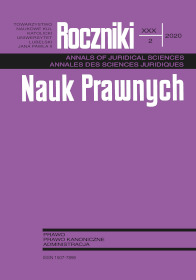Mercy in the Canon Law of Eastern Catholic Churches
Abstract
The subject of mercy in the canonical discipline of Eastern Catholic Churches is contained in the canons in which the legislator directly or indirectly recalls such theological category as well as the way of how it is to be applied to various canonical legal instruments. Among those instruments, dispensation and economy specifically dictate a moderate use of the law to obtain the highest purpose of church law, that is, to assist in one’s salvation.
The article recalls the biblical-theological rationale for the existing laws in force, that serve as the foundation ratio legis for these two legal instruments, with a particular focus on the doctrine formulated by Saint Leo the Great and Saint Thomas Aquinas.
A very significant subject in the ecumenical dialogue with the oriental Christians is the principle of economy (oikonomia), applied widely among others, especially by the Eastern Churches. An actual debate over formal inclusion of this principle into the Catholic canon law had been a subject of a papal commission that performed the work on the Code of Canon Law of Eastern Churches. In the end, however it has never been defined and promulgated into the body of the law due to the fact it has been concluded that it is already applied when such legal instruments like dispensations are utilized.
References
Baura de la Peña Eduardo: Misericordia, oikonomia e diritto nel sistema matrimoniale canonico, [w:] Misericordia e diritto nel matrimonio, red. Carlos J. Errázuriz, Miguel Á. Órtiz, Roma: Edizioni Santa Croce 2014, s. 23-45.
Dąbrówka Michał: Istota posługi głoszenia Słowa Bożego w świetle „Mów” św. Leona Wielkiego, „Vox Patrum” 34 (2014), t. 62, s. 93-112.
Grzywacz Jerzy: Dyspensa, [w:] Encyklopedia katolicka, t. IV, Lublin: TN KUL 1995, kol. 446.
Jarawan Elias: Révision des canons De normis generalibus, „Nuntia” 10 (1980), s. 92-94.
Melia Elie: Le lien matrimonial d la lumière de la théologie sacramentaire et de la théologie morale de l'Eglise orthodoxe, „Revue de droit canonique" 21 (1971), s. 180-197.
Przekop Edmund: Czy zasada tzw. „ekonomii” wejdzie do kodeksu prawa dla katolickich Kościołów wschodnich, „Studia Płockie” 12 (1984), s. 87-97.
Raport z pierwszej Konferencji Panprawosławnej, „Istina” 18 (1973), s. 372-383.
Sobański Remigiusz: Kościół – prawo – zbawienie, Katowice: Księgarnia Świętego Jacka 1979.
Sobański Remigiusz: Teoria prawa kościelnego, Warszawa: Wydawnictwo ATK 1992.
Sobański Remigiusz: Niezmienność i historyczność prawa w Kościele: prawo Boże i prawo ludzkie, „Prawo Kanoniczne” 40 (1997), nr 1-2, s. 23-44.
Sobański Remigiusz: Nauki podstawowe prawa kanonicznego, cz. 1: Teoria prawa kanonicznego, Warszawa: Wydawnictwo Uniwersytetu Kardynała Wyszyńskiego 2001.
Sztafrowski Edward: Podręcznik Prawa Kanonicznego, t. I, Warszawa: Wydawnictwo ATK 1985.
Žužek Ivan: L’économie dans les travaux de la Commission Pontificale pour la Révision de Code de Droit Canonique Oriental, mps w posiadaniu autora.
Żurowski Marian: Dyspensowania od prawa powszechnego w świetle Motu proprio De episcoporum muneribus, „Prawo Kanoniczne” 10 (1967), nr 3-4, s. 45-78.
Copyright (c) 2020 Roczniki Nauk Prawnych

This work is licensed under a Creative Commons Attribution-NonCommercial-NoDerivatives 4.0 International License.


